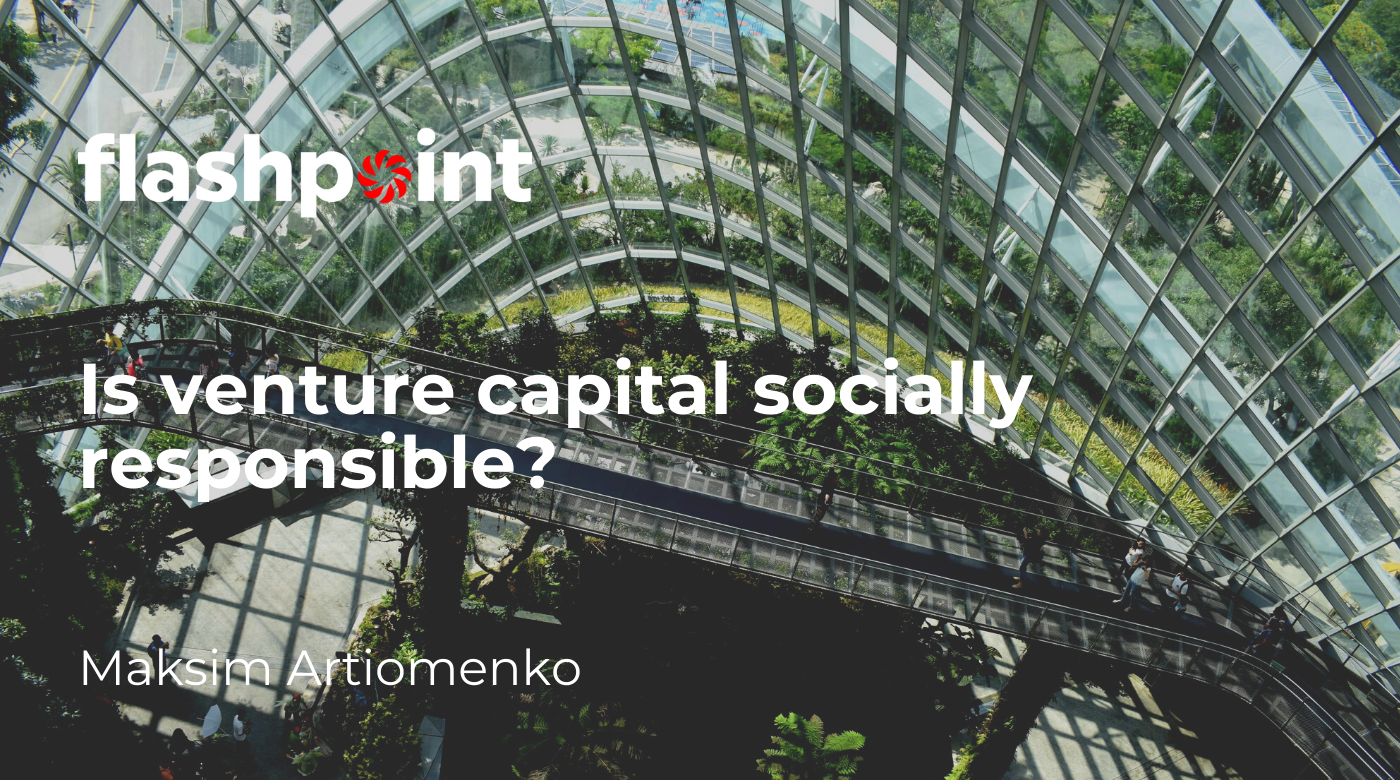Is venture capital socially responsible?

Does CSR of VCs bring value to portfolio companies? CSR of VCs — is it just a trend or real value?
What is Responsible Investing?
Corporate Social Responsibility (CSR) is a management concept and business approach in which companies integrate social, environmental, and economic concerns into their values, culture, and decision-making processes. And what about ESG? These two notions are very much related. ESG stands for Environmental, Social and Governance criteria and is seen as core to the way today’s responsible businesses operate. This set of criteria are measurable and used by investors to evaluate potential business investments that are profitable, as well as ethical. While CSR can be thought of as the qualitative side, the ESG is about quantitative assessment.
2018 Global Sustainable Investment Review shows ESG integration across global public and private markets increased 69% from 2016 to 2018. According to the 2019 Preqin Global Private Equity and Venture Capital Report almost two-thirds of investors believe that ESG guidance will become essential to alternative assets over the next couple of years.
The trend reflects a shift in investing toward greater awareness of impact. Nowadays more and more investors are looking to support the funds and companies that drive positive change.
Why is it important and what are the benefits?
Because it became clear that new technologies may bring negative consequences. Like artificial intelligence and robotics potentially ending millions of jobs, or biotechnology containing many ethical dilemmas. Quantum computing unleashing new and unforeseen behaviours in computing systems, the internet of things giving cyber-criminals a window into our world, straight into our identities and into our bank accounts. The list goes on.
Hence ESG investing has gained significant momentum over the past few years. The coronavirus pandemic has accelerated its speed. In June 2020, there were 534 sustainability-focused index funds globally, with collective assets totaling $250 billion, as stated in the Morningstar Passive Sustainable Funds: The Global Landscape 2020. Here are just some of them: Extantia, Pale Blue Dot, Contrarian Ventures, 4impact, Ananda Impact Ventures, Good Company, Impact Ventures, Limitless, Rubio Impact Ventures. A lot of new names on the venture scene follow a sustainable agenda and make their capital available for solving the most important issues faced by todays’ society.
And there is initial evidence of first success stories. For example, an HBR study showed that increased diversity in VC decision-making teams lead to increased profitability both at the portfolio and overall fund level. Similarly, a 2020 study by McKinsey & Company found that in a hypothetical M&A scenario, investors were willing to pay about 10 percent more for a company with an overall positive ESG record. It has been demonstrated that companies performing on ESG practices have higher financial growth and optimization, lower volatility, higher employee productivity, reduced regulatory and legal interventions (fines and sanctions), top-line growth, and cost reductions.
Numerous studies show that VC-backed companies have poorer CSR records, which do improve over time, but at a comparatively slower rate than non-VC-backed companies. However, when VC-backed companies receive funding from VC firms that have a responsible investment orientation and a broader stakeholder view, their CSR records are significantly better.
Is CSR fully incorporated into VC practices?
Unfortunately only a segment of venture funds incorporate impact measurement into their work and embed impact into their investment theses. Why do so many venture capitalists follow old-school patterns and ignore ESG criteria when choosing their next deal and working with portfolio companies? The reasons might be the following:
- It is still not that obvious what the ‘impact’ really is. Since the criteria is not clear yet, VCs don’t rush into this area.
- There are no reliable return numbers for impact investing yet. And since LPs have their requirements, investors need to make financial sense of their activities.
- Proven methods are always more attractive. Traditional VC model is generating returns. Why change anything?
- It’s still not that large portion of assets that is dedicated to ESG investing.
- The care for impact should be genuine. And many venture capitalists are in this industry to make profit.
Nevertheless, the trend is here to stay. Investors increasingly focus on how their portfolios broadly affect the environment and society. While LPs are likely to demand that all venture funds — no matter their focus — begin to measure and report impact along with financial performance.
How can a fund incorporate ESG?

These steps clearly require time as well as consistency and dedication. However, this strategy will definitely offer a broader range of investment opportunities and partnerships.
Flashpoint is committed to helping its portfolio companies achieve their business strategies and providing outstanding services around the world. We are committed to ethical business practices, acting in accordance with all applicable laws, and supporting the long-term sustainability of the global environment and the communities in which we and our portfolio companies operate.
We approach this responsibility from three perspectives: building standards of governance, transparency and human equality. We see this as a continuing process of improvement and one that is central to Flashpoint’s mission.
For a VC fund taking care about ESG or CSR is becoming more and more important as it helps their portfolio companies to raise further rounds at higher valuations from the top VC funds thus increasing the value of the initial investments.
